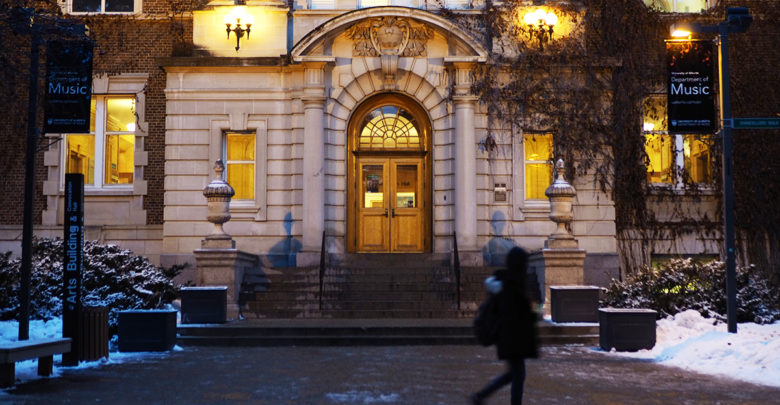University of Alberta plans for gradual return to campus; delays 2021-22 registration to May
 Helen Zhang
Helen ZhangThe University of Alberta is planning a gradual return to in-person campus learning in Fall 2021, with increased in-person learning and blended learning opportunities.
The university plan will prioritize, where possible, in-person learning for first and second-year undergraduate students, smaller graduate classes, students completing their programs, and courses that cannot be taught remotely. Class sizes will be guided by Alberta’s public health measures. The U of A provided the planning update to students at approximately 2:05 p.m. on February 23, 2021.
In the email sent to students, Provost and Vice-President (Academic) Steven Dew said that while a complete return to normal in Fall 2021 is unlikely by September, more students will experience in-person learning than previous semesters during the COVID-19 pandemic.
“We plan to welcome a significantly increased number of our university community members back to our campuses this autumn,” Dew said. “We are optimistic that Alberta’s expanded vaccine rollout and anticipated steps forward will provide the atmosphere we need to safely offer face-to-face undergraduate and graduate courses, research, and related support services across all of our campuses. These, plus some public health controls, such as masking policies, physical distancing limits, travel restrictions, are likely to make this possible.”
Dew added that larger classes and those that can proceed in an online format will likely remain online or through simultaneous remote and in-person teaching.
He added that the U of A expects to be back to regular campus routines by January 2022 — if not sooner.
“We will be as responsive as possible to evolving public health restrictions, including measures relating to travel, gathering in groups, and physical distancing. As public health measures continue to be opened up, we will make all efforts to continue to grow our on-campus community in 2021-22.”
Registration dates pushed back to allow university and students alike to plan
Additionally, the email stated that course registration dates on BearTracks would be pushed back to mid-May.
This would allow the university time to accurately plan and ensure students could “make the best decisions for their courses.”
“We’ve taken the exceptional step this year of delaying our Fall 2021/Winter 2022 registration to start mid-May,” Dew added. “By that time, students will know their anticipated course schedules and locations as the delivery formats of courses will be available in Bear Tracks by April 26. May registration dates will be sent directly to students in April.”
In an interview with The Gateway, Andrew Sharman, vice-president (facilities and operations) and executive lead of the U of A Public Health Response Team (PHRT) said the delay in registration will allow the university to have better plans in place and understanding of the current public health guidelines.
“We want to buy ourselves as much time as possible to understand what restrictions are in place, both provincially and federally,” Sharman said.
University will continue to offer academic supports and accommodations into start of 2022
Dew asked students to remain considerate and flexible as the pandemic continues to progress.
“During the pandemic, circumstances can still change quickly—for travellers, gatherings, and close contacts. It is important that we continue to be prepared and ready to adapt as necessary at the individual, group, and community level.”
He pledged that university academic supports and accommodations for students living in remote areas with internet accessibility challenges and international students taking online courses would remain in place for the duration of the 2021-22 academic year.
Vaccine rollout not the main factor driving on-campus return
Sharman said the update sent to students was meant to provide high-level information and clarity into the planning process happening right now.
“We wanted to give some information to students and staff about what we are doing at the moment and what we are hoping to achieve,” Sharman said.
“Obviously everybody wants to get back onto campuses, into the classrooms and labs,” he added. “We still have a lot of unknowns.”
Sharman said the announcement last week from the provincial government clarifying what phase two of vaccine delivery would like in Alberta helped shape some of the preliminary “thinking” about what a return to campus could look like.
“It’s not going to be back to normal [yet],” he said. “So we wanted to give some idea of our current thinking and where we hope to get to.”
“We very much hope and believe that by January 2022 we will be as close to normal as possible, but obviously we have to be prepared.”
Sharman said the availability of the COVID-19 vaccine is an “important” consideration but the return to campus will not completely rely on it.
He cited examples like what policies surrounding travel will look like — whether having a vaccine will determine eligibility for travel — or if masking will still be required as more of the population becomes vaccinated as key considerations the university is balancing onto of vaccine availability.
In his view, the restrictions in place around the world, in Canada at a federal level, at a provincial and municipal level will have more impact on how the U of A plans for Fall 2021 and beyond.
Sharman said no student would be penalized or have their academic progression delayed if they could not make it back to campus as in-person learning ramped up, especially for international students and both immunocompromised students and staff alike.
“We still have to remain flexible,” Sharman said. “Until the world is back to normal we’ve got to be flexible.”
“[Even as we move to in-person], we still have to offer some form of remote delivery to ensure they can continue to progress in their courses. So we still have to remain flexible as we get back into the classroom.”
Safety, sustainability, and student support and success will be guiding principles for university planning for 2021-22 academic year
According to the email, university planning efforts over the next two months for the academic year of 2021-22 will be guided by the following principles:
- Protecting the health and safety of students, faculty, and staff.
- Supporting continuity in the delivery method of classes throughout the term to ensure course progression and completion.
- Supporting student program completion and program progression.
- Supporting equity of access for students, regardless of where they are located or the resources they possess.
- Making sustainable choices.
- Focusing on the student experience by maximizing in-person learning and continuing to improve online learning experience; where possible, in-person learning will be prioritised for first and second-year undergraduate students, smaller graduate classes, students completing their programs, and courses that cannot be taught remotely.
Ultimately, Dew thanked students for their “continued patience” and “determined commitment” to their academic careers during the COVID-19 pandemic.
“At our heart, we are a campus culture and community. Shared learning, teaching, working, and living spaces and experiences remain integral to the university and the U of A experience. We are one step closer to being together in classrooms, conference rooms and on campus again.”




